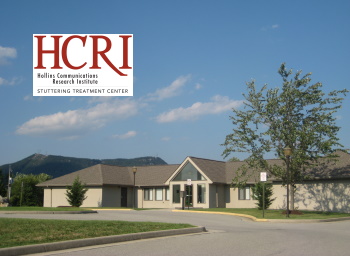NEWS ALERT: Roanoke, Va (September 12, 2019) – Hollins Communications Research Institute (HCRI), a national center for stuttering research and therapy innovation, just completed another research initiative in collaboration with the National Institutes of Health (NIH). The study is the first to evaluate stuttering therapy outcomes among a group of stutterers who possess one of four mutant genes for stuttering in comparison to a group who do not carry the same mutant genes.
Findings revealed significant fluency outcomes for both groups following participation in HCRI’s 12-day stuttering therapy program. At the same time, results suggested stuttering is slightly more resistant to therapy in individuals who carry a stuttering gene mutation. While dysfluency measures after therapy were similar for both groups, personal perceptions of fluency among the carrier group were weaker. The results of the study are published in the 2019 July/August issue of Journal of Communications Disorders.

For this research, HCRI President Ronald L. Webster, Ph.D. and his team worked in collaboration with Dennis Drayna Ph.D. of NIH’s National Institute on Deafness and Other Communication Disorders (NIDCD).
The two organizations have partnered for two decades on research to advance the scientific understanding of stuttering. HCRI was a member of the NIDCD team that discovered the genetic link to stuttering ten years ago.
HCRI stuttering therapy was used for the study because of the treatment’s quantitative, systematic methodology. In addition, HCRI clinicians have treated thousands of individuals who stutter with consistently positive results.
“At HCRI, we are in a strong position to facilitate genetics research because of our objective, physically based approach to therapy, as well as the large number of clients we have successfully treated,” Dr. Webster said.
HCRI research demonstrates that 93% of clients achieve normal levels of fluency by the end of their 12-day therapy. When evaluated two years post therapy, data indicates 75% maintain fluent speech. An additional 15% of individuals remain with improved fluency; however, they did not fall into the normal range.
Each group of stutterers was comprised of 51 individuals matched on age, gender and ethnicity. Speech samples before and after HCRI therapy were scored using detailed disfluency measures. Also, participants provided self-reported scores of their speech, based on perceived measures of struggle, avoidance and expectancy when speaking.
While therapy can be effective for mutant gene carriers, according to Dr. Webster, findings from this study provide a springboard for fine-tuning treatment when there is a genetic factor involved.
“We need to delve further into the physical details of speech, with emphasis on the carrier group,” Dr. Webster added. “Additional research will enable us to more precisely define the effects of therapy and may set the stage for customizing treatment for those individuals who carry mutant genes. And, we are working on that at HCRI right now.”
About Stuttering
Approximately 66 million people worldwide suffer from the effects of stuttering, with three million in the U.S, according to NIDCD. The condition is characterized by repeated or prolonged sounds, syllables, blocks and words that disrupt speech. Stuttering can impair social growth, educational attainment, and career potential.
About HCRI
HCRI was founded by Ronald L Webster, Ph.D. in 1972 to investigate stuttering through scientific discovery and treatment innovation. A 501(c)(3) nonprofit organization, HCRI is a leader in stuttering research and scientifically derived therapy. More than 6,500 people from across the U.S. and 50 countries have come to HCRI for stuttering treatment. HCRI is located at 7851 Enon Drive, Roanoke, Va. 24019. To learn more, visit www.stuttering.org or contact HCRI at (540) 265-5650 or info@stuttering.org.


.jpg)